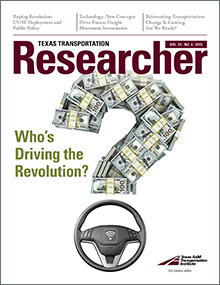
Agency Director
Transportation research often focuses on the technological side of things: how a process is done, what materials are used, and what minimum standards should be applied to promote our transportation system’s safety and sustainability.
That’s certainly the case when it comes to implementing connected and automated vehicle (CV/AV) technologies on our nation’s roadways. Although transportation has steadily evolved in the United States over time, rarely has its evolution approached a true revolution. The deployment of CV/AVs certainly qualifies, however. Not only how we drive but if we drive (or if our vehicles do it for us) are big-picture issues that impacts how our transportation system operates seamlessly, securely and safely.
We need to understand how these new technologies work, of course, but we also need to understand their impacts on transportation policy and society. Policy leaders who make investment decisions for our transportation system have questions about long-term implications of CV/AVs. How will these vehicles improve safety and mobility in the near future? How should the infrastructure adapt and support the technology to improve its safety and reliability for society? How will CV/AVs transform our roadway system over the long term? How will they influence land use and development patterns?

There are accountability considerations, too. The operation of automated vehicles, for instance, involves large amounts of data, some of which fall under the statutory definition of “personal identifying information.” How this information is gathered and secured has significant implications for citizens’ personal privacy rights. Given these variables (and more), what are the public policy implications in deploying these new technologies?
In this issue of the Texas Transportation Researcher, you’ll read about how the Texas A&M Transportation Institute’s (TTI’s) Transportation Policy Research Center is leading the nation in researching policy implications related to CV/AV implementation. In addition, through a National Cooperative Highway Research Program project, TTI is studying CV/AV policy and planning actions for state and local governments. But advances aren’t just being made on our roadways. The revolution is system wide, so TTI groups like our Freight Mobility Program are looking at how other aspects of the network can also improve to facilitate economic development in Texas.
As TTI’s work in CV/AV deployment has increased, it’s become apparent that we need a leader to coordinate the Institute’s advanced transportation research initiatives. It gives me great pleasure to announce that Dr. Christopher Poe, senior research engineer and assistant agency director, will be TTI’s connected and automated transportation strategy lead. In this role, he’ll focus on developing collaborations within the agency and beyond, and will lead the planning and implementation efforts for the Institute’s research and test beds in all areas of connected transportation.
Thought leadership, innovation and cultivating understanding among stakeholders — all are keys to effectively implementing new technologies and strategies that make our transportation system safer, more efficient and more reliable. TTI has more than 65 years of experience producing research excellence, reliability of results, and sponsor satisfaction. The area of CV/AVs provides the latest opportunity for TTI to continue that good work for Texas and the nation.
